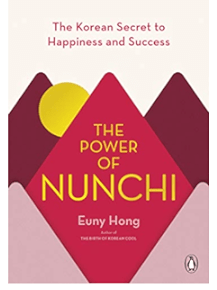Below are materials for a book-based study group. These include a book summary, vocabulary words, discussion questions, and debate topics. Study tools that might be helpful include:
- Automated Text to Speech: Speechify Text to Speech Voice Reader
- Translation: Google Translate
- Two language subtitles for videos: Language Reactor
- For word usage examples: Playphrase.me or Yarn.co
Most of these tools are available as browser extensions on desktops and as apps for mobile devices.
 “The Power of Nunchi: The Korean Secret to Happiness and Success” by Euny Hong is an insightful exploration of the Korean concept of nunchi, which could be considered a cornerstone of Korean culture and social interaction. This book serves as a guide to understanding and implementing nunchi, a practice that has been pivotal in Korean society for centuries. Through a blend of anecdotes, historical context, and practical advice, Hong illuminates how mastering nunchi can lead to greater success and happiness in various aspects of life.
“The Power of Nunchi: The Korean Secret to Happiness and Success” by Euny Hong is an insightful exploration of the Korean concept of nunchi, which could be considered a cornerstone of Korean culture and social interaction. This book serves as a guide to understanding and implementing nunchi, a practice that has been pivotal in Korean society for centuries. Through a blend of anecdotes, historical context, and practical advice, Hong illuminates how mastering nunchi can lead to greater success and happiness in various aspects of life.
Nunchi is often described as the subtle art of gauging other people’s thoughts and feelings in order to build trust, harmony, and connection. It can be likened to a form of emotional intelligence or social intuition. Hong describes nunchi as a quick and accurate reading of a room, an ability to understand the dynamics at play without words. It’s about perceiving the unspoken sentiments and reacting appropriately to them. This skill is particularly important in a collective society like Korea, where understanding and maintaining group harmony is valued.
The book begins by introducing the reader to the concept of nunchi through various personal and historical anecdotes. Hong describes how nunchi is ingrained in Koreans from a young age, where children are taught to be observant and considerate of others’ feelings and the atmosphere in any given situation. This skill is seen as essential to building and maintaining social and familial relationships. The concept is further anchored in the reader’s mind through examples that illustrate its application in everyday life.
Hong delves into the historical roots of nunchi, tracing its importance back to Korea’s turbulent history, marked by invasions and internal strife. In such a context, being able to quickly assess situations and people’s intentions was crucial for survival. This historical perspective is vital to understand nunchi not just as a social tool but as a survival mechanism that has evolved into a sophisticated form of social interaction.
In the heart of the book, Hong discusses how nunchi plays out in various facets of modern life, from family and social interactions to professional environments. She provides practical advice on how to develop nunchi, emphasizing that it’s a skill that can be learned and honed at any age. Hong outlines scenarios where nunchi can be particularly useful, such as in navigating office politics, building relationships, or in conflict resolution. For example, in a business setting, having nunchi can help one understand unspoken hierarchies and dynamics, allowing for more effective communication and strategy.
Hong also explores the impact of nunchi on personal relationships. Nunchi involves listening more than speaking, observing body language and facial expressions, and being attuned to the subtleties of interaction. This can lead to more empathetic and meaningful connections. In a society increasingly dominated by digital communication, Hong argues that nunchi is more important than ever for maintaining genuine, human connections.
An important aspect of the book is its discussion on the relationship between nunchi and mental health. Hong posits that practicing nunchi can lead to greater happiness and satisfaction in life. It encourages mindfulness and being present, helping individuals to be more connected with their environment and the people around them. This, in turn, fosters a sense of belonging and community, which are vital for emotional well-being.
However, Hong does not shy away from addressing the potential downsides of nunchi. If misapplied, it can lead to excessive conformity and suppression of individuality. She warns against using nunchi to simply blend in or to manipulate others. The key, according to Hong, is to use nunchi with empathy and balance, ensuring that it enhances rather than hinders personal and social interactions.
Towards the end of the book, Hong expands the conversation to the global stage. She suggests that nunchi has the potential to be a tool for positive change in international relations and cross-cultural understanding. In a world where misunderstanding and conflict are common, the ability to read and understand others’ perspectives is invaluable. Hong advocates for the use of nunchi to foster empathy and cooperation across cultural divides.
In summary, “The Power of Nunchi: The Korean Secret to Happiness and Success” is a comprehensive guide to understanding and cultivating the art of nunchi. Euny Hong presents this ancient Korean concept as a pathway to better communication, deeper relationships, and more effective leadership. The book is a blend of cultural exploration, historical context, and practical advice, offering a unique perspective on how emotional intelligence and social intuition, rooted in centuries of Korean tradition, can lead to a more fulfilling and successful life. Through engaging storytelling and actionable insights, Hong encourages readers to practice mindfulness and empathy, essential components of nunchi, to enhance their interactions and connections with the world around them.
- Nuance – a subtle difference in meaning or opinion.
- The nuance in her tone suggested she was not entirely pleased.
- Ingrained – firmly fixed or established; difficult to change.
- His ingrained habits made it hard for him to adapt to the new environment.
- Subtlety – the quality of being understated, delicate, or nuanced.
- Her subtlety in conveying emotions impressed the audience.
- Empathy – the ability to understand and share the feelings of another.
- His empathy for the distressed family was evident in his comforting words.
- Dynamics – the forces or properties that stimulate growth, development, or change within a system or process.
- Understanding the dynamics of group behavior is crucial in team management.
- Hierarchy – a system in which members of an organization or society are ranked according to relative status or authority.
- The company’s hierarchy was clearly defined, from interns to the CEO.
- Conformity – compliance with standards, rules, or laws.
- The school insists on conformity to its strict dress code.
- Manipulate – control or influence cleverly or unfairly.
- She was accused of trying to manipulate the outcome of the election.
- Mindfulness – the quality of being conscious or aware of something.
- Practicing mindfulness can significantly reduce stress and anxiety.
- Interpersonal – relating to relationships or communication between people.
- His interpersonal skills were key to resolving the conflict.
- Understated – presented or expressed in a subtle and effective way.
- Her understated elegance was admired by everyone at the event.
- Non-verbal – not involving or using words or speech.
- His non-verbal cues were difficult to interpret.
- Collective – done by a group of people acting as a whole.
- The collective decision was more accepted than any individual proposal.
- Turbulent – characterized by conflict, disorder, or confusion.
- The country’s turbulent history had a deep impact on its culture.
- Misinterpret – to understand or interpret incorrectly.
- Her silence was misinterpreted as agreement.
Discussion Questions
- How does the concept of nunchi compare to emotional intelligence?
- In what ways can nunchi be beneficial in a multicultural workplace?
- Can nunchi be effectively taught, or is it more of an innate skill?
- How might the practice of nunchi change in digital communication?
- Is nunchi more important in collectivist cultures than in individualist cultures?
- How does nunchi affect family dynamics in Korean culture?
- Can the overemphasis on nunchi lead to negative consequences?
- How can one balance nunchi with the expression of individuality?
- In what ways does nunchi contribute to mental well-being?
- Can nunchi be misused for manipulation in social or professional settings?
- How does nunchi play a role in conflict resolution?
- Is there a global equivalent to nunchi in other cultures?
- How can nunchi improve international relations and understanding?
- What are the challenges of practicing nunchi in a diverse society?
- How does the historical context of Korea influence the development of nunchi?
- Can nunchi be applied in leadership to improve team performance?
- How does nunchi affect the way Koreans conduct business?
- What are the differences between nunchi and simple observation?
- How can nunchi be integrated into educational systems?
- What are the ethical considerations in practicing nunchi?
Debate Topics
- Nunchi is more effective than formal education in personal and professional success.
- The practice of nunchi can lead to societal conformity and suppress individuality.
- Nunchi is an essential skill for global leaders in fostering international diplomacy.
- The benefits of nunchi in mental health outweigh its potential for misuse.
- Digitalization and online communication are diminishing the relevance of nunchi.
- Nunchi should be integrated into school curriculums worldwide.
- The emphasis on nunchi in Korean culture is a significant factor in its economic success.
Views: 9





Leave a Reply